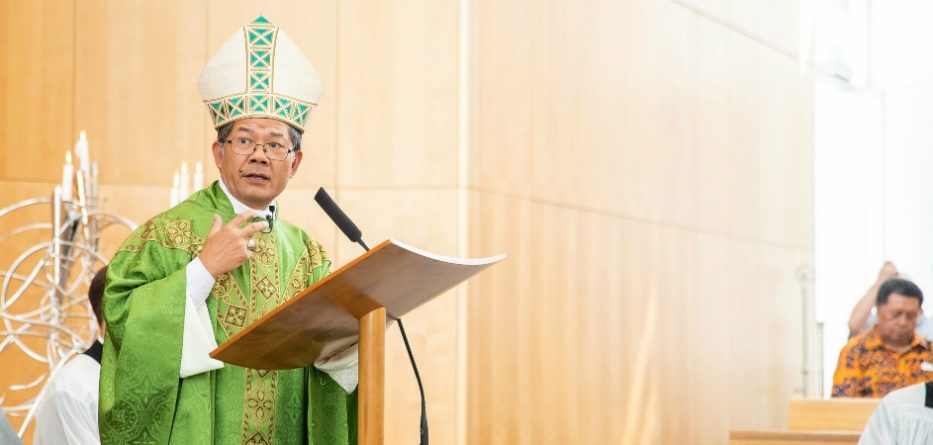Most Reverend Vincent Long Van Nguyen OFM Conv DD STL, Bishop of Parramatta
Homily for the 25th Sunday in Ordinary Time Year A 2020 at Sacred Heart Parish, Blackheath
Readings: Is 55:6-9; Phil 1:20-27; Matthew 20:1-6
20 September 2020
Healing conflict and building communion
Dear brothers and sisters,
As Queen Elizabeth II once famously said, it has been an “annus horribilis” for humanity. The pandemic has caused much pain and destruction with no end in sight. If there is a lesson for us to learn, the pandemic should be putting everything in perspective for us all. It should sensitise us to the sufferings of the poor and all creation. We need a radical new way of living that brings harmony and sustainability to all of life. Even if and when we get back to ‘normal’, we need to think and act differently; we need to rewire ourselves to be in communion with one another as a human family and as part of nature.
There is much wisdom in God’s Word today as we learn to think and act in alignment with God’s plan. In the first reading, Isaiah challenges us with a radical notion of the divine intent. Prophesying a new future for his people after the exile, Isaiah invites the Israelites to abandon the competitive, greedy and self-centred practices of old. The new Israel would not serve the interests of the fittest and the strongest but those of the lowly, the poor or the anawim.
Jesus expands on this notion of the divine intent for God’s people. In one of the most intriguing and confronting parables, he upsets the expectations and the commonly held views of the status seeking and result-driven society. He makes it clear that the economy of the Kingdom is not based on individual merit, competition, success and achievement; rather it is predicated on the common good, justice, inclusion and equality for those who are at the margins.
In the parable, the owner of the vineyard goes into the market square and hires workers to work in his vineyard. He does this at different hours of the day and still he employs them, some as late as the 11th hour. At the end of the working day, the owner pays them their wages starting with the last arrival. These receive a generous day’s payment even though they have only worked for less than a day. Seeing this, the other workers are excited. Yet to their disappointment, they too get as much pay as the Johnny-come-latelies.
The way God works, as Isaiah says, is unlike our reward system that favours the strong and clever. It is really about paying attention to the weakest link in the chain. It is about taking care of the most disadvantaged and the most vulnerable among us. Justice and equality are more important than fairness and entitlement.
Brothers and sisters,
Through the parable, we can see aspects of our own society. We are reminded of the faces of the most vulnerable including the lowest paid, those living on income support, those at risk of homelessness, and Indigenous Australians. They are the asylum seekers, refugees and those who are easily expendable in the harsh calculus of the political system.
Pope Francis wrote for the World Day of Migrants and Refugees this year, saying that the pandemic has reminded us how we are all in the same boat and how no one can be saved alone. Yet fear has consigned the weakest links in our society further into the forgotten corners of destitution, oblivion, and indignity. Asylum seekers cut off from any form of financial support or even Medicare. Families with young children languish in detention centres.
The owner of the vineyard feels real solidarity with these. He does not blame them for their inability to find work. He sympathises with them. He sees them as deserving a basic human dignity. He also sees the faces of their children, who need bread and clothing. We are challenged to see and act with the concern, generosity, and compassion of the vineyard owner. We are called to create a society where the well-being of the most vulnerable is a matter of priority for everyone.
Let us reject an economy of exclusion and inequality and instead seek one that is inclusive and sustainable – one that gives and nurtures life. We are called to work for an economy that is inclusive and capable of putting the needs of the poor before the wants of the rich. We envisage an alternative to marketplaces that are harsh and inhospitable: the vineyard, lush and green, sustainable in its growth and inclusive in its economy.
Jesus subverts merit-based mentality. He challenges the culture of entitlement and the survival of the fittest. He points us to the whole new way of living and relating. His is a new paradigm of shared humanity, equality, inclusion, and human flourishing. Let us pray that we learn to operate out of Jesus’ new paradigm, which will transform us into humble servants of the Kingdom. May our sharing at this table strengthen us in our commitment to live and relate according to the values of the Gospel. May we – filled with the fullness of life and love of God – share and live out the driving passion of Christ to be men and women for others.








